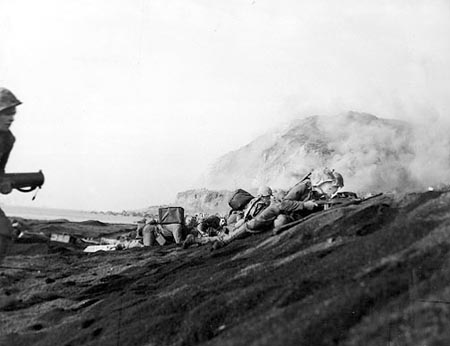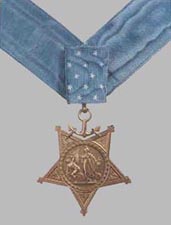 |
jacklummus.com Home Page Search Contact Us Site Map
Click the <Back> arrow to return to the previous page.
Battle of Iwo Jima and Medals of Honor Awarded
 |
The President of the United States Harry S. Truman signed twenty-seven Citations presenting the nation's highest award, the Medal of Honor, to twenty-two Marine Corps and five Navy heroes for their extraordinary contributions in winning the Battle of Iwo Jima.
On Monday, December 9, 1861 Senator James Wilson Grimes, Republican from Iowa, introduced Senate Bill 82 in the Second Session of the 37th Congress. It was mainly a bill to promote naval efficiency, and included a statement authorizing, "the Secretary of the Navy to cause two hundred 'medal of honor' to be prepared...."
Senate Bill 82 passed the House and Senate with amendments on December 18. The enrolled bill was signed by the Speaker of the House, Galusha Aaron Grow, on December 19, and the President of the Senate, Vice President Hannibal Hamlin, on December 20. President Abraham Lincoln approved and signed Senate Bill 82 into law on December 21, 1861 creating the Navy Medal of Honor.
On February 17, 1862, Senator Henry Wilson, Republican from Massachusetts, proposed a similar resolution on behalf of the army. It was signed into law by the President on July 14, 1862 creating the Army Medal of Honor.
"The Medal of Honor is awarded in the name of Congress to a member of the navy or military who distinguishes himself or herself by conspicuous gallantry and intrepidity in the line of duty. The deed performed must have been one of personal bravery or self-sacrifice so conspicuous as to clearly distinguish the individual from his or her comrades and must have involved the risk of life. Incontestable proof of the act is necessary and each recommendation for the award is considered on the standard of extraordinary merit.
"These individuals, regardless of rank, race or religious belief, are linked by an ideal which springs from the deepest roots of all that is best in humanity. At a time of trial and crisis their first thoughts were of others; their actions exhibited a spirit of self-sacrifice that is universally recognized and respected. When they could have done less without blame or dishonor, they gave more, responding 'above and beyond the call of duty.'
"The Congressional Medal of Honor is a symbol of those high ideals. It is this nation's expression of gratitude and recognition to those individuals whose uncommon valor sets them apart from other men or women."
 |
“THE
GRAY STREAKS of the Central Pacific dawn caught Iwo Jima at exactly 0640 on
February 19, 1945. As the blackness dissolved and the outline of the island
sharpened, it was caught, too, by something else. Warships of the U.S. Pacific
Fleet opened the pre-invasion bombardment.
"Streaming
toward the transport area about ten thousand yards offshore were the
troop-carrying ships of the invasion armada. Aboard, fifty thousand Marines
gobbled a breakfast of steak and eggs, then hustled topside for a look at this
island we wanted so badly.
"Directly
ahead Iwo Jima’s shadowy land mass sloped up from the sea. Splashes of red
flickered along its purplish hump and melted into exploding billows of smoke and
dust. Suribachi, obscured by this manmade blanket, gave thousands of straining
eyes aboard ship only periodic glimpses of its sharp, vertical cone.
"This
long-awaited sight heightened the last-minute tension felt alike by veterans of
previous operations and by the first-timers counted among the thousands in the
landing force.
"The
men who studied the sharpening scene were thoughtful men, regardless of what
they might have said or done. Everything had been done for them that an
efficient military organization could do—their equipment was probably the best
in the world; they had been well fed; they had attended religious services; they
had been intelligently and thoroughly briefed; they were, and would continue to
be, a tough, efficient team. Yet at this moment, each man was alone to think his
own thoughts and make his peace with himself. Probably few men who watched Iwo
loom before them thought about it as a final resting place or as a place where
they, themselves, were apt to receive personal harm or injury. It was always
some other poor devil who was killed or wounded—never you. The human mind is
indeed a strange and wonderful thing.
"It was apparent that the landing force had had a lucky break in the weather. The sea was relatively smooth and surf conditions were as satisfactory as they ever are on a small island exposed to the full force of the sea. The sky was clear, visibility virtually unlimited, temperature 68 degrees, and wind eight to ten knots from the north.”
| Howard M. Conner, The Spearhead: The World War II History of the 5th Marine Division, |
| Infantry Journal Press, Washington D.C. 1950 |
| The Charge of the Light Brigade by Lord Alfred Tennyson |
The following is the list of the twenty-seven awarded the Medal of Honor:
On March 26, 1945 at 0800 Major General Harry Schmidt, Commander of the Fifth Amphibious Corps, declared the operation completed thus ending the Marine Corps' combat presence in the Battle of Iwo Jima. He closed his command post, and withdrew from the island on the afternoon of the 26th. The following day troops of 3rd Marine Division trudged to the east beach, and embarked aboard landing crafts that would take them to waiting transports. Fourth and 5th Divisions followed. After 36-days and 35-nights of bitter fighting against General Kuribayashi's subterranean garrison ensconced in a near impregnable fortress, and their job finished, Fifth Amphibious Corps abandoned the malevolent little island to the U.S. Army.
At 1800 on March 27, 1945 Marine Corps and Navy casualties incurred in the Battle of Iwo Jima were officially reported as follows:
| Marine Corps |
| Official Reports: | Officers | Men |
| Killed in action | 215 | 4,339 |
| Died of wounds | 60 | 1,271 |
| Missing, presumed dead | 3 | 43 |
| Wounded in action | 826 | 16,446 |
| Combat fatigue casualties | 46 | 2,602 |
| Navy |
| Official Reports: | Officers and Men |
| Killed in action | 363 |
| Died of wounds | 70 |
| Missing, presumed dead | 448 |
| Wounded in action | 1,917 |
Including March 26, 1945, Japanese killed and sealed up in caves was 20,703, and only 216 had been taken prisoner.
History of the Navy Medal of Honor
Click the <Back> arrow to return to the previous page.
© 1999-2007 Utility Press Inc. All rights reserved. Copyright claim exclusive of photograph.